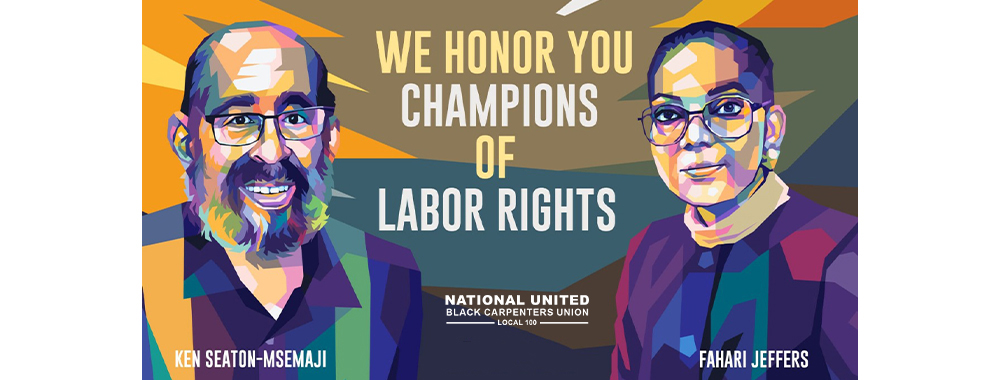At the inaugural event of the National United Black Carpenters Union (NUBCU) Local 100 on November 19, 2024, Ken Seaton-Msemaji graced the stage as an honored guest, embodying the spirit of perseverance and transformation. With his trademark wisdom, he reminded the audience, “Everything is impossible until it is done,” and pledged his unwavering support to the union’s mission.
Ken Seaton-Msemaji’s journey into activism began in the heart of the labor movement, deeply inspired by Cesar Chavez. Chavez recognized the parallels between the struggles of farmworkers and domestic workers, both of whom were predominantly women, immigrants, and people of color. This connection laid the groundwork for the formation of the United Domestic Workers Union (UDW). Together with his wife, Fahari Jeffers, Ken co-founded UDW in 1978, creating one of the few unions founded by and for people of color.
A Life of Purpose and Action
Born in San Diego, California, Ken was driven by a sense of justice and a desire to uplift marginalized communities. His partnership with Chavez was pivotal in aligning the struggles of domestic workers with the broader labor movement. Chavez’s vision planted a seed in 1976, and Ken, alongside Fahari, nurtured it into a statewide labor union dedicated to protecting home care workers’ rights.
Ken’s activism extended beyond union organizing. He and Fahari adopted 16 children, many of whom were undocumented immigrants, symbolizing their commitment to nurturing and protecting the vulnerable. Ken often reflected on this dual legacy of building a family and a union, noting, “Our struggle to put the union together and form our family kind of paralleled each other.”
Fahari Jeffers: A Magnificent Legacy
In Swahili, “Fahari” means “magnificent and rare,” and Fahari Jeffers lived up to her name in every way. A San Diego native and the daughter of a domestic worker, Fahari was a trailblazer who broke barriers with grace and determination. By the age of 20, she had earned a BA from San Diego State University and later pursued a law degree and a master’s in public administration.
As a co-founder of UDW, Fahari was instrumental in shaping the union’s mission to advocate for women and people of color in the labor force. In 2018, she was inducted into the San Diego County Women’s Hall of Fame, a testament to her profound impact on her community. Reflecting on the honor, she said, “There are many women who make groundbreaking, enormous contributions to our community that we will never meet or hear of… their work is valued and recognized.”
Fahari’s quiet brilliance, elegance, and tenacity were pivotal in building a union that represented the often-overlooked workforce of domestic and home care workers. Her legacy is a reminder of the power of advocacy and the importance of lifting others as we rise.
Bridging the Past and Present
Ken and Fahari’s groundbreaking work aligns seamlessly with the mission of NUBCU Local 100. Like UDW, NUBCU is committed to breaking barriers and creating opportunities for Black workers in an industry that has historically marginalized them. Ken’s presence at the inaugural event was a symbolic passing of the torch, uniting the struggles of domestic workers with those of Black carpenters.
In his address, Ken emphasized the importance of perseverance: “Cesar planted the seed, but it’s up to us to keep it growing.” His words resonate deeply with the ethos of NUBCU, which strives to ensure that Black carpenters are not only included but thrive in every aspect of the construction industry.
Honoring Their Legacy
The lives of Ken Seaton-Msemaji and Fahari Jeffers remind us of the transformative power of unity, vision, and unwavering determination. They opened doors for countless workers, proving that even the most marginalized voices can shape the future.
Today, as NUBCU Local 100 carries forward the legacy of advocacy and empowerment, we honor the incredible contributions of Ken and Fahari. Their story is a testament to what can be achieved when we refuse to accept the status quo and instead work tirelessly to create a more equitable world.
Ken and Fahari, we honor you.



Leave A Comment